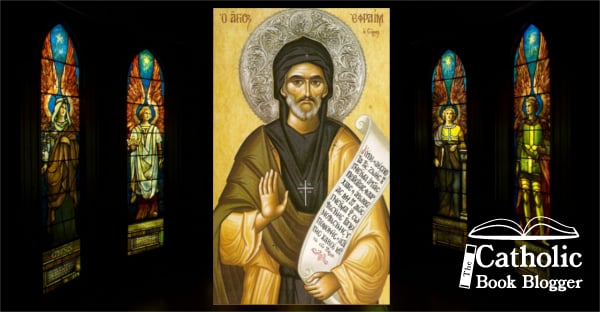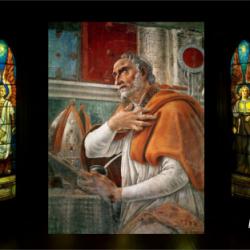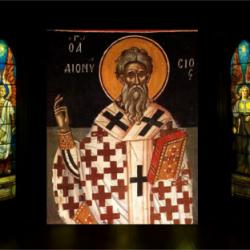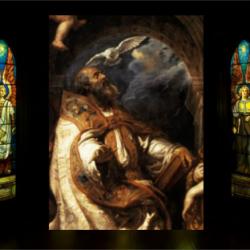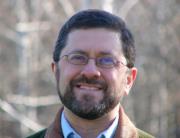 This week I am adding an exciting new feature to The Catholic Book Blogger. On a roughly once per month cycle I will step aside and let someone else post a book review. Those who will be posting will be some of today’s leading Catholic authors. Mike Aquilina has graciously agreed to write the first CBB guest book review. Here is his review of Al Kresta’s latest book Dangers to the Faith : Recognizing Catholicism’s 21st-Century Opponents.
This week I am adding an exciting new feature to The Catholic Book Blogger. On a roughly once per month cycle I will step aside and let someone else post a book review. Those who will be posting will be some of today’s leading Catholic authors. Mike Aquilina has graciously agreed to write the first CBB guest book review. Here is his review of Al Kresta’s latest book Dangers to the Faith : Recognizing Catholicism’s 21st-Century Opponents.
When I was very young, I toured a newsroom, and I remember seeing a card at someone’s desk. It read: “Is it true? Is it kind?” Those questions have always summed up the profession of journalism for me. Honesty and charity are defining qualities of the best in the business.
They define Al Kresta, and they shine throughout his new book, “Dangers to the Faith: Recognizing Catholicism’s 21st-Century Opponents” (Our Sunday Visitor).
Kresta is a veteran broadcast journalist and host of the daily “Kresta in the Afternoon” talk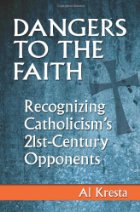 show, which airs on more than 220 stations as well as on Sirius satellite radio.
show, which airs on more than 220 stations as well as on Sirius satellite radio.
His fans (I confess, I am one) wait upon his wit and pithy, memorable phrases. They will not be disappointed by “Dangers to the Faith,” and I suspect their numbers will swell.
It is an eminently useful book, addressing challenges to the Catholic faith most commonly encountered in the media, in the classroom and in the workplace. Kresta presents the charges, almost always in the words of those making the charge, and then he provides the Catholic response. Many of the charges are based on misunderstandings, urban legends or bigotry, and Kresta is expert at exposing these for what they are.
What makes him especially effective, though, is that he manages to do this in a way that’s always fair, always kind and scrupulously truthful.
The key, I think, is that he looks to the source of the charges and sees “opponents,” not “enemies.”
“This is a work about opponents to the Catholic faith,” he writes. “We owe it to them, as a mark of decency and common humanity, to represent their positions in ways that they would recognize as fair and accurate.” Then he follows through. He assumes good will. He goes not for the jugular, but for conversion. Some of the opponents come off looking quite virtuous, if badly mistaken.
“Dangers” is structured as a handbook, easily browsed to find quick answers to the zinger someone threw at you today. Why did the Catholic Church brutally suppress all but the four canonical Gospels? Why is the Catholic Church opposed to genetic research? What does the pope have against science?
Divided into four parts, it addresses different types of opponents:
1. Abusers of Spirituality and Revelation.
2. Abusers of Science and Reason.
3. Abusers of the Past and Future.
4. Abusers of Power and Wealth.
In the first category, he places those who oppose the Catholic faith on religious or “spiritual” grounds. These range from academic Muslim philosophers to New Age gurus. Catholics may be surprised by the vehemence of Islam’s rejection of core Christian doctrines and practices. For example, many Muslims hold the invocation of God as “Father” to be blasphemy. Kresta allows Muslim apologists and ordinary believers to have their say, and he presents their arguments in the most sympathetic light before giving the Catholic response.
He does the same for the New Age gurus, simply quoting them at length — though they don’t hold up as well. To his credit, Kresta withholds commentary and simply allows us to visualize actress Shirley MacLaine repeating the phrase “I am God. I am God.”
In the second category, Kresta examines the New Atheists’ rhetorical tendency to portray the church as the enemy of science. His lists of Catholic pioneers and Nobel laureates in science is a powerful counter-testimony. Just as effective are his detailed accounts of Catholics at the cutting edge of research today. He demonstrates that the arguments against the Catholic position on fetal research can be used against any ethical restraint whatsoever in science and technology.
The three chapters on Christian origins, in the book’s history section, are by themselves worth the cover price. Kresta demolishes the supposed historical arguments against Christian orthodoxy, and he does so by giving the essentials, never bogging down in the marshes of minutiae.
The last section looks at anti-Catholic trends and forces in government and in the market.
Some of the attackers are full of hatred for the faith. Some of them admit that they would like to see the church persecuted. But Kresta shows not a hint of a martyr complex. And he doesn’t return their disrespect. He offers no conspiracy theories. His tone is urgent, but never hysterical.
He also corrects Christian misconceptions that can arise from prejudice. He speaks, for example, of Catholics who caricature the God of Islam: “Sometimes Christians overstate … by saying that Allah does not love. In Allah’s 99 names, he is the merciful and compassionate, even loving one. He is quick to forgive and as close to the believer as one’s jugular vein.”
Kresta does not want to perpetuate enmity, but dispel it. He wants Catholics to behave “constructively” when responding to their cultured despisers. But he does want us to respond — and in an intelligent, informed way.
Often, he points out, people are mistaken about Catholicism, and we the faithful are at least partly to blame — because we have not lived the faith or shared it as we should. Says Kresta: “Let’s face it. Many Americans prefer Oprah’s way of doing it to our way of not doing it.” Ouch.
The book is packed with facts, and every claim is well documented. Kresta doesn’t let his narrative bog down, but he provides still more evidence in his hundreds of footnotes.
It’s a big book, more than 300 pages, and so will be satisfying by itself for some readers — and for others a very useful gateway to greater learning. And greater witness.
BIO:
Mike Aquilina is author or editor of more than forty books on Catholic history, doctrine, and devotion.
He is co-host, with Scott Hahn, of eight series that air on EWTN. For many years he also appeared as a regular panelist on “The Weekly Roman Observer,” broadcast by Catholic Familyland Network. He is a frequent guest on Catholic radio and appears weekly on EWTN’s “Sonrise Morning Show.”
Mike’s career in publishing spans three decades, and hundreds of his articles have appeared in periodicals and journals in the United States and abroad.
You can find out more about Mike and his work at his website http://mikeaquilina.com/


